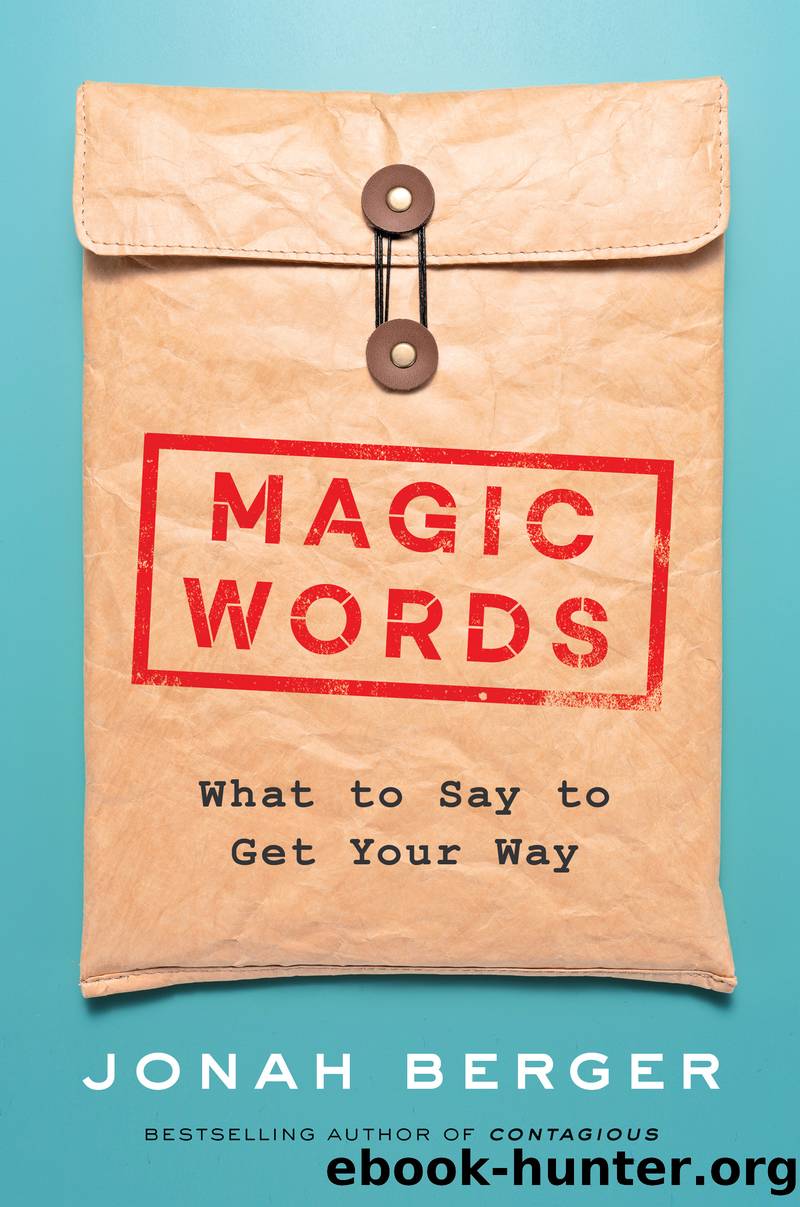Magic Words by Jonah Berger

Author:Jonah Berger
Language: eng
Format: epub
Publisher: HarperCollins
Published: 2023-01-19T00:00:00+00:00
The story starts negatively. Cinderellaâs parents have died, and she is a maid for her cruel stepmother. Things start to improve (she gets invited to a ball and meets a prince), but then they get worse (she has to run off at the stroke of midnight). Eventually the story ends on a high note.
Given the importance of stories, the idea that stories have shapes is a fascinating one. And in the decades that followed Vonnegutâs suggestion, the concept captured popular imagination. Videos of Vonnegut talking about different shapes went viral, and major news outlets breathlessly claimed that all stories in the world could be captured by a few common patterns.
But while the notion of story shapes is intriguing, actually identifying such shapes is a bit more challenging. Some have suggested that the story of Cinderella looks one way, for example, while others have suggested completely different shapes.
Further, even if stories do have shapes, that begs the question of whether those shapes actually matter. Itâs one thing to note that there are different types of stories, but itâs another to see whether certain ways of telling stories actually make them more engaging and impactful.
To answer these questions, some colleagues and I dived into the science of stories. We started by analyzing tens of thousands of movies, everything from blockbusters such as Forrest Gump and The Matrix to small indie films such as The Marsh and An Invisible Sign. We looked at newer movies such as The Hunger Games and Argo and older movies such as Jaws and the original Star Wars.
And to quantify their shapes, we analyzed the words they used.2
Some words are more positive than others. Words such as âlaughter,â âhappiness,â âlove,â and ârainbowâ are pretty positive.3 They often appear in positive situations, and most people feel positively when they hear them.
Words like âpandemic,â âfuneral,â âcruel,â and âcry,â on the other hand, are more negative. They represent undesirable things that make most people feel negatively.
Words like âanyway,â ârepeat,â and âPittsburghâ are somewhere in between. They are used in both positive and negative situations and donât make most people feel particularly happy or sad (unless you happen to love or hate Pittsburgh).
We broke each movie script into dozens of pieces, each a few hundred words long, and averaged the positivity of the words in each part.* Parts that talked about a character finding their lost love, reuniting with friends, or discovering a lost treasure were scored as relatively positive, while parts that talked about a rough breakup, an argument, or the hero almost dying would be scored more negatively.
Then, we used these scores to plot each movieâs emotional trajectory. Similar to the figure of the story of Cinderella, how positive or negative things were at different parts of the narrative.
To get a sense of what this looks like, here is the emotional trajectory of the original Star Wars.
Download
This site does not store any files on its server. We only index and link to content provided by other sites. Please contact the content providers to delete copyright contents if any and email us, we'll remove relevant links or contents immediately.
We Need to Talk by Celeste Headlee(4861)
Pre-Suasion: A Revolutionary Way to Influence and Persuade by Robert Cialdini(3404)
Captivate by Vanessa Van Edwards(3292)
I Love You But I Don't Trust You by Mira Kirshenbaum(3223)
Goodbye Paradise(2948)
How to win friends and influence people by Dale Carnegie(2818)
How to Win Friends and Influence People in the Digital Age by Dale Carnegie & Associates(2814)
The Hard Questions by Susan Piver(2549)
Fluent Forever: How to Learn Any Language Fast and Never Forget It by Gabriel Wyner(2442)
The Dictionary of Body Language by Joe Navarro(2426)
Surrounded by Idiots by Thomas Erikson(2324)
The Story Factor: Inspiration, Influence, and Persuasion through the Art of Storytelling by Annette Simmons(2243)
Just Listen by Sarah Dessen(2175)
How to Be Yourself by Ellen Hendriksen(1932)
The Power of Moments by Chip Heath & Dan Heath(1888)
Behave: The Biology of Humans at Our Best and Worst by Robert M. Sapolsky(1817)
How to Make Small Talk by Melissa Wadsworth(1796)
Not Nice: Stop People Pleasing, Staying Silent, & Feeling Guilty... And Start Speaking Up, Saying No, Asking Boldly, And Unapologetically Being Yourself by Dr Aziz Gazipura PsyD(1752)
The Small BIG Small Changes that Spark Big Influence by Steve Martin & Noah Goldstein & Robert Cialdini(1533)
